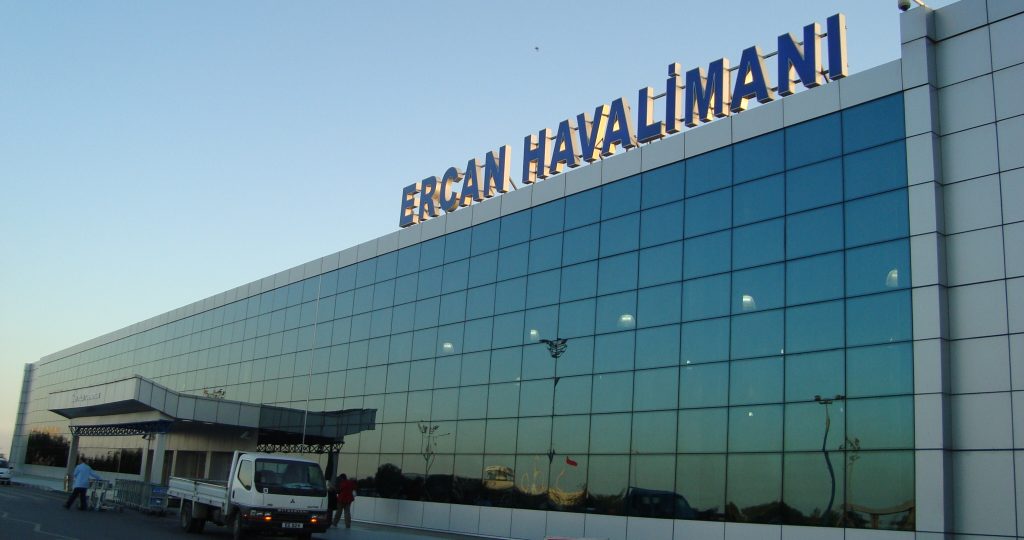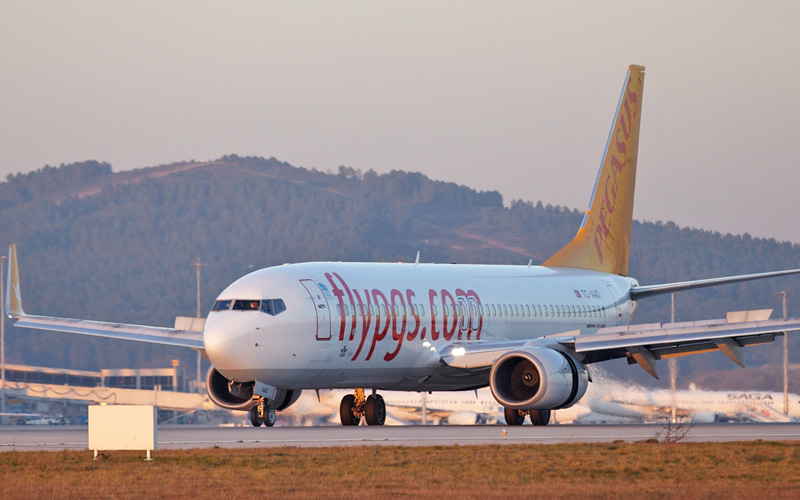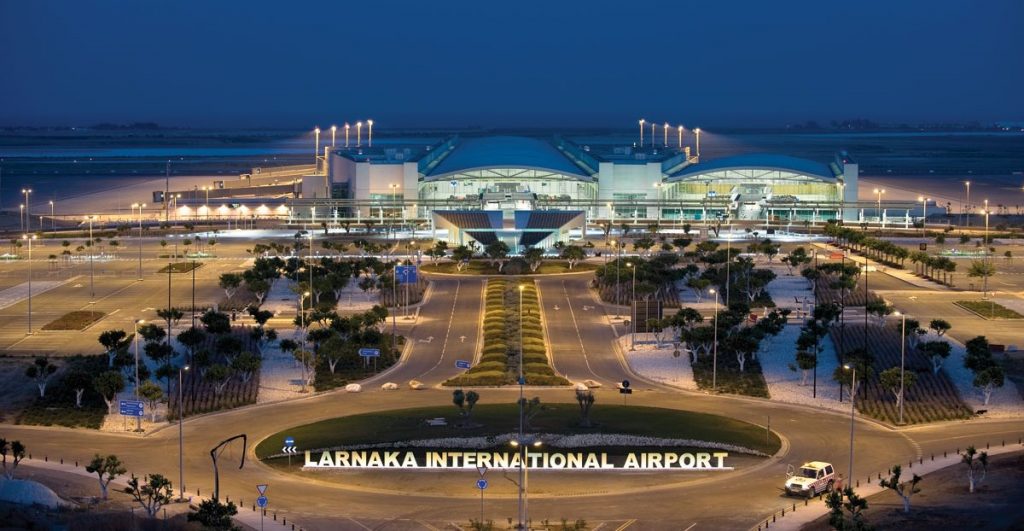Tourists to the Turkish Republic of North Cyprus are opting to use Larnaca International Airport following new security measures imposed by Britain on flights from Ercan Airport. One leading tour operator said they had seen a 400% increase in customers booking flights to Larnaca and a corresponding drop in those choosing to travel to Ercan Airport via Turkey.
Earlier this year, Cyprus’ biggest carrier was forced by the UK’s Department for Transport to introduce new security measures. Instead of remaining on the plane, since June 1st Pegasus passengers travelling between Britain and North Cyprus have had to disembark with their luggage, go through a fresh security check in Turkey and board a new aircraft for their final destination.
These same rules had already been adopted by Turkish Airlines and Atlasglobal, but Pegasus, which annually ferries over half-a-million people to Cyprus, had resisted. However, rising concerns over terrorism and the UK’s inability to confirm whether security procedures at Ercan Airport were up to international standards resulted in diplomatic and commercial pressure being applied so Pegasus would also comply.
Although British officials only require these new restrictions on flights destined for Britain, those handling security arrangements in Turkey have said the rules need to be consistent on both legs. As a result, Pegasus passengers to and from Ercan have been forced to disembark in Turkey.
The new rules have added more than an hour to journeys that are already extended due to the TRNC’s international isolation, which prevents direct flights to Ercan. The impact has been most keenly felt by the elderly, and those with mobility problems and young children, pushing many to forego their preference of travelling to North Cyprus and instead use an airline that flies direct into neighbouring South Cyprus.
Leading tour operator to TRNC: “1 in 5 UK travellers we book now flies into a South Cyprus airport”
Cross-border travel has been possible in Cyprus since 2003, although Ercan remained the airport of choice for the bulk of British tourists visiting the TRNC. Now increasing numbers are choosing Larnaca, located in the southeast of the island.

One of the UK’s biggest tour operators to the TRNC said, “Customers to Larnaca have jumped from 1,000 to 5,000 compared to the same period last year. It means one in every five flights we book now flies into an airport in the South – a 400% increase on last year.”
The owner of the tour operator, who asked not to be named, said he feared having spent years building up flights to Ercan that “travellers are now drifting to Larnaca and it will be very hard to bring them back.”
“Travellers are now drifting to Larnaca & it will be very hard to bring them back”
The company has also received dozens of complaints from passengers who have remained loyal to Ercan and Pegasus, but are extremely unhappy with the changeover in Turkey. Many have sent the tour operator scathing emails about their experience, or left angry voicemails vowing never to fly the same route again.
Other TRNC specialist travel agents and tour operators have reported similar trends in their flight bookings this year. One London-based agent said that although they did not promote flights via Larnaca, they would facilitate if this is what the customer wanted:
“Most of our customers have been happy to keep flying with Pegasus and the changeover hasn’t been too bad. Some customers have said they’ve enjoyed getting off the plane to stretch their legs and visit the facilities in the Turkish airports. But when customers ask for flights via Larnaca we will book these too.”
He added, “Even with a touchdown in Turkey, there is not much difference in cost [between the two airports] and when you consider the extra time needed to travel from an airport in the South to the North, you don’t actually gain much time by using a direct flight. Many of our customers also have concerns about border incidents and attacks on TRNC-plated vehicles in the South.”
“Customers have concerns about border incidents & attacks on TRNC-plated vehicles in the South”
During the past month, Greek Cypriot protests at the border with the TRNC have seen check-points repeatedly closed to traffic. On 23 August, officials in the South also held up a large convoy of Turkish Cypriot travellers making their annual pilgrimage to Erenköy for a ceremony to commemorate those who fought to save the strategic village 53 years ago. The trip from the TRNC requires a short journey into South Cyprus, but Greek Cypriots objected to the fifty plus vehicles going across from Yeşilırmak, keeping them waiting at the check-point for hours in the intense summer heat.
Travellers from North Cyprus are also vulnerable to attacks from Greek Cypriot racists. The latest incident occurred in Nicosia late on Wednesday night when Aziz Canaş, a Turkish Cypriot taxi driver, was returning from Larnaca Airport after collecting British tourists due to holiday in North Cyprus.
Heading for the Metehan check-point in the capital, the taxi stopped at traffic lights near to Apoel FC. The car was surrounded by a small mob who tried to attack them. While no one was injured in the incident, both the passengers and driver were extremely shaken by the experience. The assailants had tried to prise open the doors of the taxi, which were locked at the time. They then spat on the windscreen, threw a beer can at the vehicle and kicked it before Canaş could move off.

The spot is notorious for similar incidents targeting cars with TRNC number plate. Yet, to date, the police have yet to apprehend and prosecute anyone for these racist attacks.
Turkish Cypriot business owners and civil society have called on the TRNC Government to improve security at Ercan Airport, which would enable the UK transit block to be lifted, but there has been little, if any, action. Officials at the TRNC Ministry of Transport have failed to comment on the issue, despite being repeatedly invited to do so by T-VINE Magazine.
30% of TRNC holidaymakers have travelled abroad via an airport in the South
In 2016, 3.7 million passengers used Ercan, making it the second most popular airport in Cyprus. Figures for 2017 have yet to be released, but the TRNC’s main air hub is not only losing British business to airports in the South, but also suffered a dip in passenger numbers from its domestic market. According to a report in Kıbrıs newspaper, this past year, some 30% of TRNC holidaymakers have travelled abroad via an airport in the South.
Flights and hotels are generally more expensive over the summer, with the upcoming Kurban Bayramı (religious public holiday) pushing prices up even further. As a result, many Turkish Cypriots have plumped for European destinations for their annual holidays. Polatkan Turizm and Cyprus XP – two of the TRNC’s biggest travel agents – told Kıbrıs that Spain and Italy were among their most popular destinations for 2017. Hunting for the best deals for their customers, the agents said a week’s holiday in Europe starts from 700-800 TL per person, while flights to Antalya alone, which usually cost 100 TL, currently cost 700TL.
Main image source: Glassline Industries




